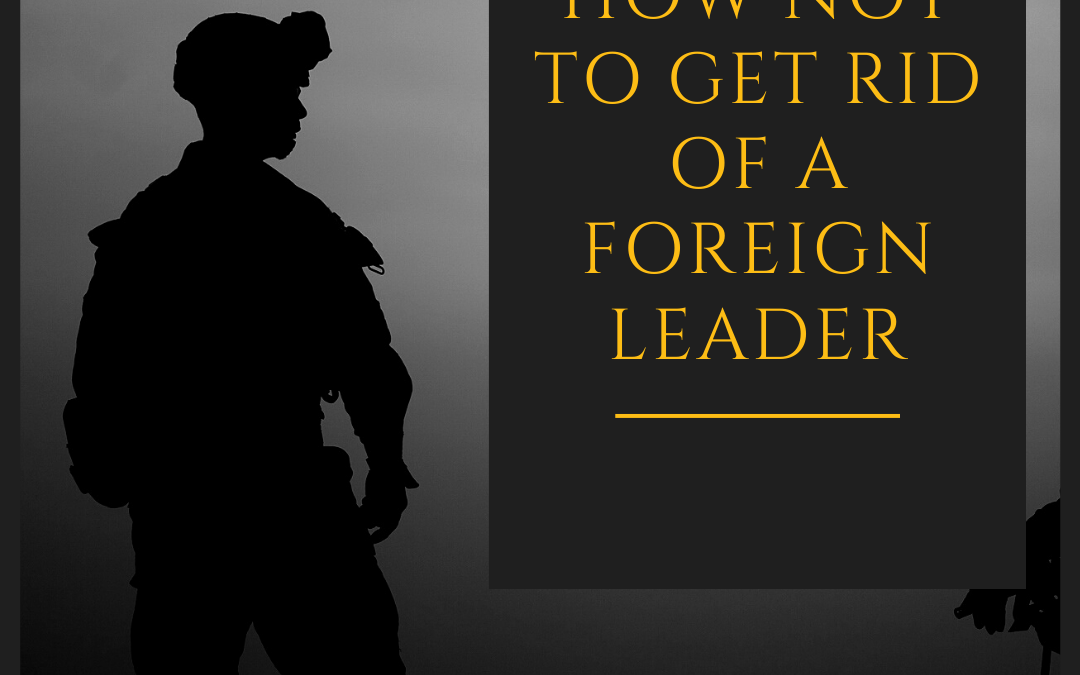How not to get rid of a foreign leader
When I read that a former American Green Beret had engineered a clandestine invasion of Venezuela , I thought it was a joke. It was not. The operation sounded a lot like the Bay of Pigs invasion of Cuba in 1961. Except that “The Bay of Piglets” was even less successful than the original. It has been clear for several years that the US government wishes to get rid of the dictator Nicolas Maduro. Less clear is whether the Trump administration had anything to do with this clumsy attempt to oust him (as the Venezuelan invaders had been led to believe). Let’s hope not. As a former Navy SEAL, I felt embarrassment as well as horror that a fellow American special operator could lure well-meaning Venezuelan opponents of the Maduro regime into embarking on a suicide mission to capture the dictator.
Then what?
The truth is that political opposition to a foreign leader can be expressed through diplomatic channels, economic sanctions, different forms of propaganda, and humanitarian aid – all part of a long-term strategy, executed in coordination with regional governments and international buy-in. The US supported “democratic” insurgencies against communist and socialist leaders during the second half of the 20th Century – with money, weapons, and proxy forces. That didn’t go so well. You’d think we’d have learned that regime change can only come from within a nation saddled with bad leadership (unless you consider the invasion of Iraq a ringing success). We are still in Afghanistan because the United States wants to “win” more than the citizens of Afghanistan (whatever winning is).
So, what’s a frustrated American government to do when “soft power” tools don’t work? One essential ingredient is “strategic patience” (a corollary to Barack Obama’s maxim “Don’t do stupid stuff”). The problem with saying that the US favors regime change is that, when stupid stuff like this happens, we are automatically suspected of supporting it.
My first novel considered the foreign policy frustration factor, borne from decades of trying to balance hard and soft power, wielded against unsavory regimes. The US relationship with Colombia seemed like a good context for my wacky plot (which doesn’t seem so wacky now). Jungle Rules is a story about what happens when the American ambassador has a “brilliant” idea to kidnap Colombia’s most powerful drug lord and keep him out of sight – then frame the country’s president for the crime. In my story, the American president and CIA are onboard.
In the novel, this plan does not go so well. Carl Malinowski – on contract to CIA – discovers that his body snatch is the opening act of a rogue operation that goes way beyond framing the Colombian president. Carl and his men are forced back into the jungle to rescue the author of the plan after he is himself kidnapped by the cartel. Then the Colombian president is assassinated by a rival cartel. Carl recovers the ambassador, only to find out his own government is trying to kill him, along with the other witnesses. Now all he has to do is get out of the jungle alive! Tempted as he is to use his own hands to exact revenge, Carl testifies against the American conspirators, and the justice department puts them behind bars.
Carl Malinowski is a warrior, but he also believes that – outside the jungle – all men deserve a fair trial. Even bad men.
So, the Venezuelan people are left to take matters into their own hands. The US should help them indirectly with soft power, but only the Venezuelans themselves can get rid of Maduro.
The moral of the story: Don’t say or do stupid stuff.


Recent Comments